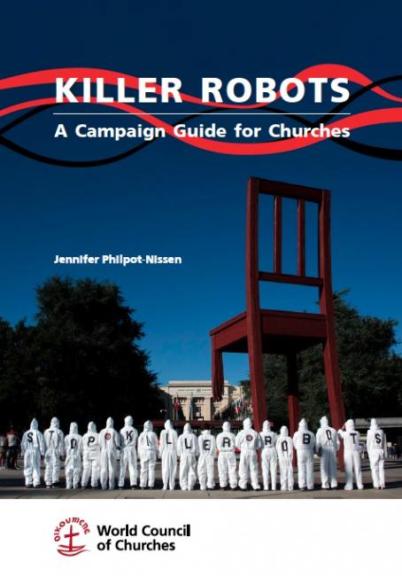The guide is designed to introduce churches to the issue of killer robots, and help raise awareness of the need for Christians to act to ensure decision-makers agree on a pre-emptive ban on the future development of such weapons.
The guide was released in December 2021, with a webcast moderated by Dr Emily Welty, vice-moderator of the World Council of Churches (WCC) Commission of the Churches on International Affairs, who introduced four speakers who shared their perspective and their work related to killer robots.
“We are excited to share the guide as a resource which you will now find available on our website,” said Welty, who summarized why churches need to weigh in on the dangers of autonomous weapons systems.
“More commonly known as killer robots, such weapons would make decisions on who lives and who dies,” she said. “In response to the concerns of its executive committee, this year the WCC has drafted a campaign guide for churches to better understand the potential threat of the development of such weapons.”

Image: WCC Publications
Governments met at the UN in Geneva from 7-11 March 2022 to again consider the need for an international ban. Whilst almost all States agree that human control must be maintained over weapons systems, they are divided over the way to achieve this, and several continue to reject any calls for an international legal framework for this.
"Several governments – inevitably the militarized and weapons-producing nations – have taken advantage of any possible reasons to delay progress on discussions, eager to stall proceedings whilst the developments in technology continue to gain speed,” said Welty. “Technologies are now so developed, that militaries could deploy autonomous weapons at any time.”
Isabelle Jones, campaign outreach manager for the Campaign to Stop Killer Robots, described the new guide as “a fantastic resource.”
Jones explained the history of the campaign, how it advocates before the UN, and why killer robot technology is so concerning.
“What this means is less direct human engagement and understanding over what’s happening, and it means we’re getting closer to getting machines making decisions over who to kill, which we believe is a moral red line that must never be crossed,” she said.
Rev. Kolade Fadahunsi, director of the Institute of Church and Society of the Christian Council of Nigeria, said increasing awareness of killer robots has become an increasingly important item on his agenda.
Fadahunsi, who has been involved in campaigns to abolish nuclear weapons, is now applying his communication and networking skills to campaign against killer robots as well. From printing literature to writing letters to policymakers—and now putting the new WCC guide to use—he plans to promote the topic even more.
"I know that one of the challenges we have now is we have not been able to call on a wide spectrum of young people to bring them on board in the country,” he said.
Bishop Michael Vorster, director of Ecumenical Affairs for the Methodist Church of Southern Africa, agreed that quite a bit of work still needs to be done but added that there is a growing interest.
“I really do think this booklet is going to help because it places the issue in the context of the religious community, because that is where we operate,” he said.
Bishop Christopher Cocksworth, Bishop of Coventry, reflected on how the power of prayer ties into the campaign. “As a church, before anything else, we start with prayer,” he said. “Prayer allows us to confront issues with honestly and humility. Prayer is empowerment.”
The challenge surrounding killer robots, he added, is one that can be addressed through accurate information and education as well.
“They seem too distant a threat and too technical an issue to be handled in, say, a sermon,” he said.








